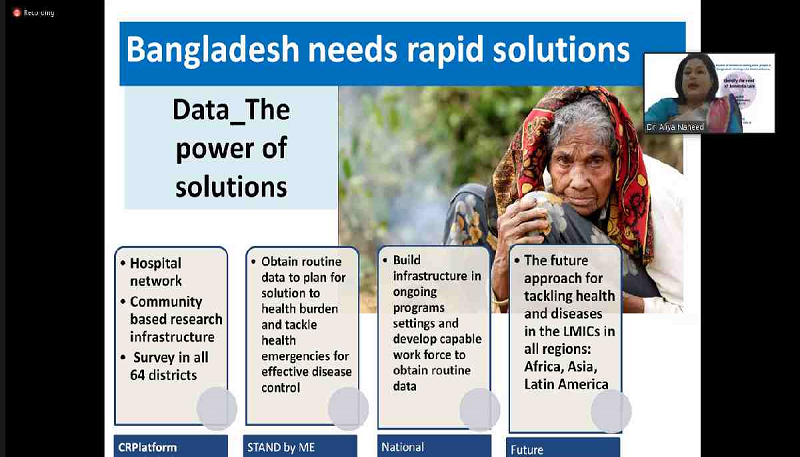
One in every 12 individuals 60 years or older in Bangladesh have dementia (prevalence 8 per cent), says a national survey on Wednesday.
The burden is higher in Rajshahi (15 per cent) and Rangpur (12 per cent) than other divisions and did not vary between urban and rural areas (8 per cent).
The burden of dementia among females was found higher than males across all ages and divisions.
The study estimates that the total number of dementia cases in Bangladesh in 2020 could be about 1.1 million, including 0.28 million males and 0.83 million females.
The study projects that the number could increase to 1.37 million in 2025 and could be doubled in 2041 (2.4 million), which may increase even further if not intervened effectively.
On Wednesday, icddr,b in collaboration with the Non-Communicable Disease Control Programme of the Directorate General of Health Services (DGHS) and the National Institute of Neuroscience and Hospital (NINS), organised a virtual webinar titled “The burden of dementia among older people in Bangladesh: Findings of a National Survey” to disseminate the recently concluded survey findings.
Professor Dr Abul Bashar Mohammad Khurshid Alam, Director General, DGHS, graced the occasion as the chief guest.
Dr Tahmeed Ahmed, Executive Director at icddr,b, and Prof Quazi Deen Mohammad, Director, NINS were special guests, while Prof Dr Robed Amin, Line Director, NCDC Programme, DGHS chaired the event.
Dementia is a syndrome in which there is deterioration in memory, thinking, behaviour and the ability to perform everyday activities.
According to the World Health Organisation (WHO), about 50 million people have dementia globally, and 60 per cent of them are from low-and middle-income countries.
It is to be noted that there is very little information on dementia among the South Asian population, including Bangladesh.
The unavailability of data has challenged the policymakers to consider and develop strategies and programmes to provide quality care to its senior citizens who suffer the most.
The majority of the NCD prevention and control programmes target productive age groups with little emphasis on mental health.
In order to estimate the prevalence of dementia and major non-communicable diseases in seven administrative divisions of Bangladesh, icddr,b and NINS conducted a nationwide survey from April to September 2019.
The survey involved 2,796 older adults (≥60 years of age), who were randomly selected from urban and rural communities.
The study looked at the burden of dementia, and variations by socio-demographic status, region and striking result regarding healthcare-seeking patterns among the older aged population in Bangladesh.
The study found that more than half of the individuals with dementia had one or more chronic conditions (multimorbidity), including hypertension (52 per cent), depression (54 per cent), and diabetes (8 per cent).
More than a third of the individuals with dementia had a poor nutritional status (35 per cent underweight), low physical activity (49 per cent), high salt intake (56 per cent) and high tobacco consumption (76.6 per cent), which is a common risk factor facing NCDs.
Almost all individuals with dementia reported having sought healthcare in the past six months (90 per cent).
They have also frequently visited drug sellers (16.6 per cent) than a qualified doctor either in a private facility (12 per cent) or a government facility (5.4 per cent).

Commenting on the importance of the study Prof Dr Quazi Deen Mohammad, Director, NINS and the study’s co-principal investigator said there is a lack of understanding about dementia within the community hence it is diagnosed at a very late stage.
"We need to conduct more research on dementia to identify factors leading to a rising burden of dementia in the country and facilitate effective treatment.”
Prof Dr Robed Amin said, “Older people, especially with multimorbidity, are the worst sufferer of the Covid-19 pandemic. Yet, we don’t have a holistic service care model within the health system conducive to the elderly. Now it is the need of the time to develop a doorstep service for these vulnerable people with the combined effort of government, private and research organisation.”
Dr Aliya Naheed, Scientist and Head, Initiative for Non-communicable Diseases at icddr,b and the study’s principal investigator said for the first time we have looked into dementia and its burden in Bangladesh more closely than ever engaging quite a large number of senior citizens. Old age is undeniable, which demands an empathetic support system central to old-age care.
'Evidence from our study will indeed help design a comprehensive healthcare model beyond the traditional biomedical approaches.”
“It will also help integrate public health measures through a lifecycle approach and mitigate risks of non-communicable diseases and tackle chronic conditions like dementia in old age.” – she added.
The study called for a concerted effort of the family, society, private sectors, and the government would be essential to support old-age healthcare and will help reduce the burden of dementia in Bangladesh, and an innovative local evidence-based intervention to halt the increasing burden of dementia in Bangladesh.